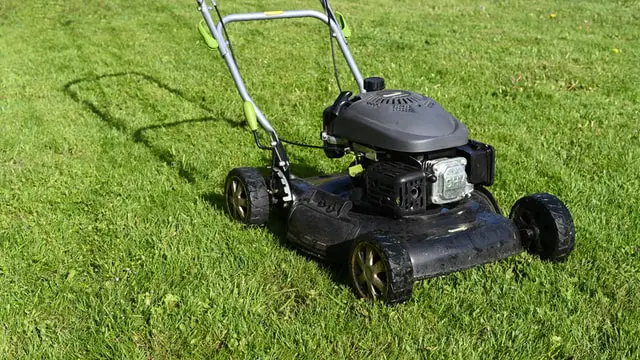Lawnmowers usually have small engines, especially when compared to that of an automobile. However, when it comes to diagnostics, lawnmowers are trickier than vehicles. If your lawnmower has been out of use for quite a while, it could make it difficult to charge.
Here’s a similar piece we did on snowblowers.
Most of the time, when we store away a lawnmower, we neglect maintenance. Nevertheless, in situations where the lawnmower doesn’t start, diagnosis is vital. A starter fluid would help you determine the issue and also start the engine for you. In this article, we’ll be covering:
- How to spray starter fluid on a lawnmower
- When to spray starter fluid on a lawnmower
- When not to spray starter fluid on a lawnmower
Without further ado, let’s dive right in.
This START YOUR ENGINES starting fluid comes highly recommended.
Contents
How to Spray Starter Fluid on a Lawnmower
Spraying starter fluid on your lawnmower is relatively easy, and the steps below make them more straightforward for you to follow.
- Firstly, you should remove the air filter cover from the lawnmower and clean it up.
- The next step is to also locate the carburetor and clean it so everything is in optimum condition.
- After you remove the air filter from its housing, take off the housing entirely also.
- Now, spray a dose of starter fluid directly into the carburetor chambers.
- Once you do this, you should set the engine speed to midpoint if the ideal is adjustable. However, when it is equipped, you should set the choke to full choke.
- Now, start your mower by pulling the starter string. If it has an electronic starter key, then use that.
Sometimes, the lawnmower starts and stops all within three seconds. In such a situation, then your carburetor is what requires adjustment. If the lawnmower starts for more than three seconds but doesn’t last up to thirty seconds, then it’s a case of bad fuel. Alternatively, the fuel could be water-saturated and need changing.
When to Spray Starter Fluid on a Lawnmower
Starter fluid is quite beneficial, especially in engines with a carburetor like a lawnmower. Many people use the starter fluid to determine what’s wrong with their lawnmower. The spray starter is an excellent diagnostic tool for discovering the issues with your lawnmower engine.
In winter, you should also spray starter fluid on a lawnmower if the machine finds it difficult to start. If the carburetor is in good condition, then a spray starter will ensure your engine starts instantly.
When Not to Spray Starter Fluid on a Lawnmower
You shouldn’t use starter fluid on diesel engines. On such occasions, it could significantly damage the lawnmower. Additionally, you shouldn’t use a starter spray on a 2-cycle gasoline engine. If there’s something wrong with the lawnmower, simply wait to get instructions from an expert.
Only use the starting fluid when the expert asks you to utilize it on the engine. A spray start is only ideal for carbureted engines because fuel can quickly vaporize through the tiny holes. If the gasoline does not evaporate in the cold, it could cause issues in your lawnmower engine. However, it usually ignites easily in the cold, which allows the engine to start and heat the fuel.
If your lawn mower starts with starter fluid then dies, here’s a solution.
Some people encounter stalling after spraying their lawnmower with starter fluid. If you have such an experience, we recommend watching this video below to find out what to do.
- How to Get Potatoes to Sprout Eyes: Detailed Growing Guide with 3 Options - July 31, 2023
- Weight of a Medium Potato: Revealed in Detailed Guide - July 29, 2023
- Maris Piper Potatoes: 9 Substitutes You Should Know About - July 27, 2023
Hello! I’m Jessica Zander, a garden coach and consultant based in the Boston area (zone 6b), offering virtual consultations across the country and Canada.
I’ve been passionate about gardening since the early 1990s, and in 2022, I launched You Can Do It Gardening to empower individuals to feel more confident in their gardening endeavors.
Following a 30-year career in nonprofit finance and operations, I transitioned out of that field in mid-June of 2023 due to the growing demand for coaching services. Interestingly, my years of presenting financial statements to boards and finance committees proved to be valuable experience for teaching people about gardening! I enjoy sharing skills, providing guidance and suggestions, and collaborating efficiently with clients to make significant improvements to their outdoor spaces, both small and large. I also regularly teach at the Arlington Continuing Education and Cambridge Adult Education.
My approach is direct and practical, akin to Mary Poppins, but tailored to your garden. Clients find satisfaction in saving money and taking pride in their own gardening achievements.


Add comment